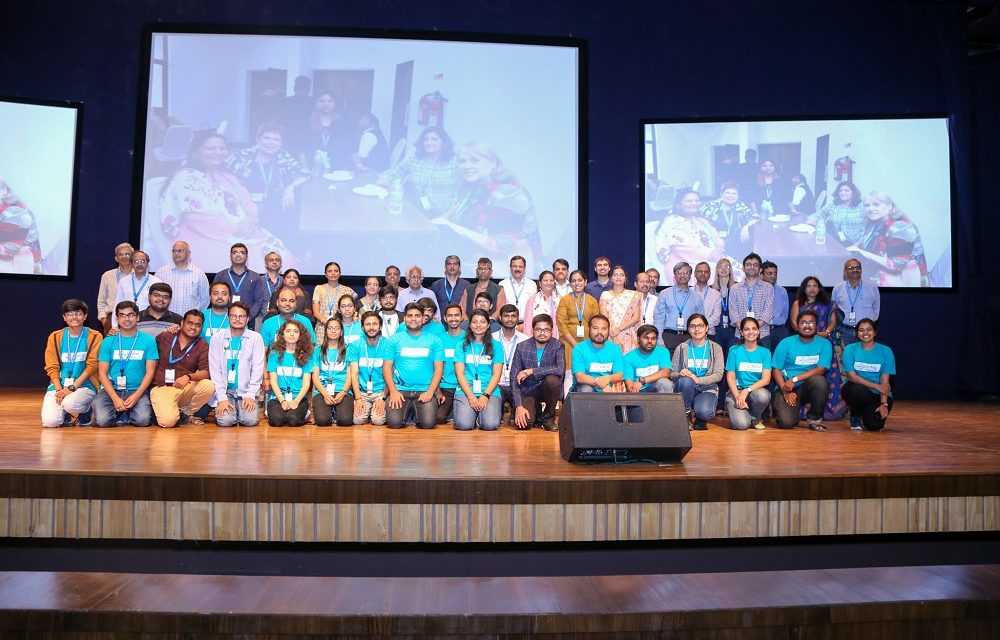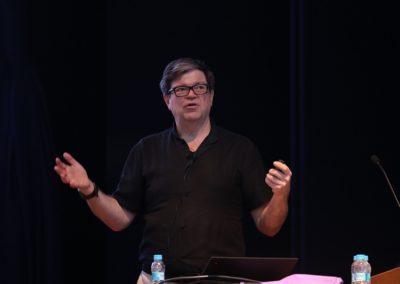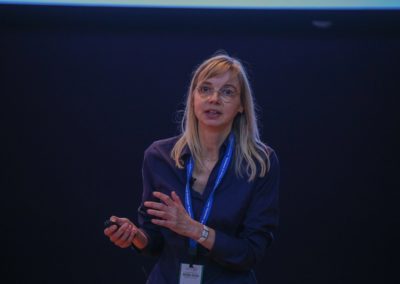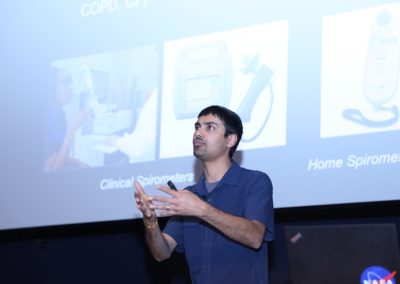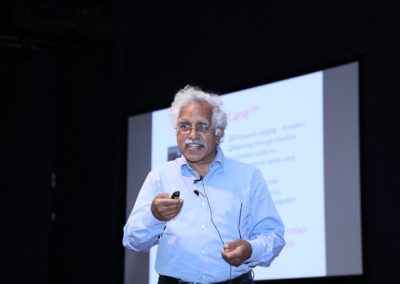Indian Institute of Technology Gandhinagar (IITGN) hosted the Association for Computing Machinery- India (ACM-India)’s annual event 2020 on February 15. The event saw an overwhelming participation of more than 1200 students, researchers, faculty members, and professionals of computer science and allied areas from all over the country. The prestigious event was graced by Prof Cherri Pancake, President of ACM; Prof Abhiram Ranade, President of ACM India; ACM Award winners as speakers; Shri Abhishek Singh (IAS), President & Chief Executive Officer of National e-Governance Division; and ACM-India Office Bearers.
ACM India organises this annual flagship event to discuss trends in science and technology, and to celebrate ACM’s spirit and India’s accomplishments in computing. At the outset of the event, Prof Harish P M, Dean, Students Affairs, IITGN, provided an overview of IITGN’s core values and culture and the innovative and inclusive environment it offers to its community and visitors.
Prof Cherri Pancake, President of ACM, presented ACM report and introduced participants with the various activities of ACM for computing professionals, researchers and educators, to advance computing as a science and a profession. Prof Abhiram Ranade, President of ACM India, presented ACM India report and highlighted ACM India Council’s various initiatives for research, education, continuing education for professionals, industry-academia linkages, gender issues, and so on. He also introduced ACM India’s CSPathshala, a Computational Thinking Curriculum for Std I to Std VIII, that has reached more than 3 lakh students, 1100 schools, 5400 teachers, in a bid to do their bit for localisation of the subject. On the occasion, ACM-India Doctoral Dissertation Awards 2020 and Best Chapter Awards 2020 were also presented to the winners.
This was followed by four engaging talks by eminent experts and ACM Turing Award winners. Prof Yann LeCun, a French-American computer scientist from the New York University, Chief AI Scientist at Facebook and 2018 ACM Turing Award Winner, who works primarily in the fields of machine learning, computer vision, mobile robotics and computational neuroscience, delivered a talk on ‘Self-Supervised Learning: the Next Step in AI’. He described the brain as the inspiration for initiation of earliest work in Deep Learning, a system innovation that has caused revolutions in computer perception, image synthesis, natural language understanding, and control. He went on to explain various models, aspects, and experiments of Convolutional Network (ConvNets) Architecture and its application to recognize multiple objects, faces and figures, including billions of photos uploaded on Facebook every day that go through a handful of ConvNets within seconds for segmentation.
Elaborating further Prof Yann LeCun said that 3D ConvNet can be used for medical image analysis, breast cancer detection, faster MRI, in Physics and in Astrophysics to predict the cosmological structure formation. He said that Supervised Deep Learning works well when you have data. He also gave examples of research experiments where Deep Learning can save lives, by deploying automated emergency braking systems, by detecting tumour in mammograms, and by filtering online content like hate speech, calls for violence, weapon sales etc. However, he went on to explain that in contrast to the humans and animals, who largely learn vast amounts of knowledge about the world quickly by mere observation and occasional actions, successes in Deep Learning techniques rely on supervised learning, where the machine is trained on a large number of examples augmented by human-provided interpretations. Prediction is the essence of intelligence, and so, Self-Supervised Learning (SSL) signifies to train a machine to predict missing information by generally ‘filling in the blanks’. For example, predicting missing words in a text, occulted parts of an image, future frames in a video. He also described a number of applications of self-supervised learning, including using a forward video prediction model to train autonomous cars to drive defensively by learning to predict how other cars around you will move.
Prof Susanne Albers, a German theoretical computer scientist from the Technische Universität München and a recipient of the Gottfried Wilhelm Leibniz Prize, talked about ‘Algorithms Beyond the Worst Case’. She explained various theories of worst-case analysis for algorithm performance, various aspects of online paging, and different analytical approaches and its applications in computer science.
Prof Shwetak Patel, an American computer scientist and entrepreneur from the University of Washington, with familial roots in Gujarat, and Winner of 2018 ACM Prize in Computing, best known for developing novel sensing solutions and global computing, spoke about ‘New Ways of Thinking of the Mobile Phone for Healthcare’. He described a collection of research projects conducted with his clinical collaborators that utilise different sensors on mobile devices (e.g. microphones, cameras, accelerometers, etc) in new ways to enable the screening, self-management and longitudinal study of various diseases. “Point of care diagnostics is one particular major revolution that happened in the healthcare field. There are several opportunities for diagnostics using mobile phones, including pulmonary, blood screening, cardiovascular, and disease-specific”, he said. He went on to introduce some of the apps and services invented by them using simple mobile phone sensors to measure lung function, detecting and studying cough, tuberculosis, newborn jaundice, osteoporosis, and so on. He underscored the potential advances in health and clinical science through the convergence of sensing, machine learning, and human-computer interaction. He advised students that this is an unprecedented time to work towards major global problems.
In the end, Prof M Balakrishnan, a Professor in the Department of Computer Science & Engineering at IIT Delhi, Founding Vice-Chancellor at Satya Bharti Institute of Technology and ACM Eugene L Lawler Award Winner, gave a talk about ‘Assistive Technology Solutions for Mobility & Education of Visually Impaired’. He presented the work of ASSISTECH, IIT Delhi in developing solutions, including a SmartCane, Bus Finding device ‘OnBoard’, Tactile Diagrams, and braille keyboard prototypes ‘Dot Book’, aimed at addressing challenges of independent mobility and education of visually impaired in India and other low-income countries. He stressed that assistive technology design for India needs to be user-centric, affordable and infrastructure-friendly. Further, he also talked about the challenges in translational research and its dissemination in this area.
About ACM:
ACM, the Association for Computing Machinery is the world’s largest educational and scientific society, uniting computing educators, researchers and professionals to inspire dialogue, share resources and address the field’s challenges. ACM awards the Turing Award (aka Nobel Prize in Computing). ACM supports professional growth of its members by providing opportunities for life-long learning, career development, and professional networking. ACM is recording a healthy growth in India, and ACM India was launched in 2010 to increase the focus on the country.
About ACM Turing Award:
The A.M. Turing Award, the ACM’s most prestigious technical award, is given for major contributions of lasting importance to computing. The A.M. Turing Award, sometimes referred to as the “Nobel Prize of Computing”, was named in honor of Alan M. Turing (1912–1954), the British mathematician and computer scientist, who articulated the mathematical foundation and limits of computing. He made fundamental advances in computer architecture, algorithms, formalisation of computing, and artificial intelligence. Turing was also instrumental in British code-breaking work during World War II.
This news was covered by some of the leading Indian newspapers and media agencies. Click on the link below to read more.

